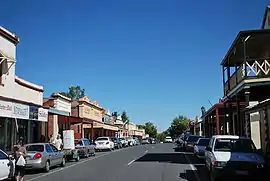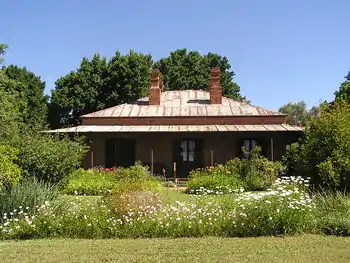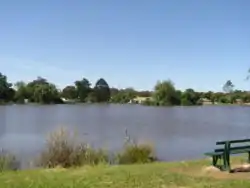Chiltern, Victoria
Chiltern is a town in Victoria, Australia, in the northeast of the state between Wangaratta and Wodonga, in the Shire of Indigo. At the 2006 census, Chiltern had a population of 1063. It was the birthplace of Prime Minister John McEwan. The town is close to the Chiltern-Mount Pilot National Park. Chiltern was once on the main road between Melbourne and Sydney but is now bypassed by the Hume Freeway running one kilometre to the south.
| Chiltern Victoria | |
|---|---|
 Main street | |
 Chiltern | |
| Coordinates | 36°09′0″S 146°36′0″E |
| Population | 1,063 (2006 census)[1] |
| Postcode(s) | 3683 |
| Location | |
| LGA(s) | Shire of Indigo |
| State electorate(s) | Benambra |
| Federal Division(s) | Indi |
History
The area around Chiltern is the traditional lands of the Dhudhuroa people. The nearby Yeddonba Aboriginal Cultural Site, in the Chiltern-Mt Pilot National Park, includes artworks created by the original inhabitants of the Chiltern area, including one ochre painting thought to represent a Thylacine, an animal now extinct and which has been extinct on mainland Australia for thousands of years.[2]
The area of Chiltern was on the Wahgunyah cattle run and was known as Black Dog Creek. The township, named after the Chiltern Hills in England, was surveyed in 1853 but not established until gold discoveries in 1858-59 during the greater Victorian Gold Rush period. The Post Office opened on 1 September 1859.[3]
The Chiltern Magistrates' Court closed on 1 January 1983, not having been visited by a Magistrate since 1972.[4]
Many of Chiltern's buildings are classified by the National Trust. In 1859, many shop-keepers and miners from around Beechworth and the Ovens Valley districts followed the rush and re-located into Chiltern.
The Grape Vine Hotel, on the corners of Main Street and Conness Street, boasts the largest grapevine in Australia, planted in 1867.
Gold


The discovery of gold in late 1858 and early 1859 brought a huge shift in population into the Chiltern – Black Dog Creek area. Gold discoveries drew many miners away from the nearby Ovens goldfields; namely Beechworth, Nine Mile Creek and Stanley during the big drought of 1859. Unlike those surface-based sluicing mining operations around Beechworth, the gold around Chiltern was extracted by sinking deep wet leads. These operations required a different type of miner and working groups, capable of sinking shafts to some 400 feet in depth. Miners with these skills and abilities came into the area, from Ballarat and Bendigo and joined with the sluicers from around Beechworth and the Ovens. Miners from the Ballarat goldfields were considered 'radical', because of their connections with the Eureka Rebellion (1854). Some of these miners were colourful characters and the most notable, a colourful and radical A.A. O'Connor, stood for parliament in 1859 as the would-be member for the Ovens; his escapades and the social tensions his candidature aroused appear in O'Brien's book which is cited below.
While Beechworth's gold production declined during 1859, due in part to the drought and lack of water for sluicing, Chiltern's gold production increased (O'Brien), to such an extent that Chiltern looked as if it would usurp the importance of Beechworth. Beechworth was the most important regional centre in North-eastern Victoria during the gold boom of 1852–1859. Chiltern did overshadow Beechworth within a few years, especially when the main Melbourne-Albury rail by-passed Beechworth. Finally, when the gold dwindled during the early 1900s, so did Chiltern.
The town today
The town hosts an antique fair in August and an art show in June. The Chiltern-Mount Pilot National Park lies close to the town.
Golfers play at the Chiltern Golf Club on Howlong Road.[6]
The winning clip of the 2009 J Award for Best Music Video of the Year, Alex Roberts' video for Art vs. Science's Parlez-vous Français?, was entirely shot in this town.
Several movies have been shot using Chiltern's well-preserved Victorian-era streetscapes, including Walt Disney's 'Ride a Wild Pony'.
Transport
The railway station is serviced by V/Line services running between Melbourne and Albury.
Chiltern Football Club
Chiltern played its first game of Australian Rules Football against Beechworth in 1876.
Chiltern has an Australian Rules football team that competes in the Tallangatta & District Football League.[7]
Chiltern FC have played in the following official football competitions -
- 1893 to 1903 - Ovens & Murray Football League[8]
- 1904 - North East Central Football Association[9]
- 1905 - Half Day Holiday Football Association[10]
- 1906 to 1908 - Ovens & Murray Football League
- 1909 - Federal Junior Football Association[11]
- 1910 - Ovens & Murray Junior Football Association
- 1911 - Rutherglen & District Football Association
- 1912 to 1916 - Chiltern & District Football Association
- 1917 & 1918 - Chiltern FC in recess, due to World War I
- 1919 to 1940 - Chiltern & District Football Association
- 1941 to 1944 - Chiltern FC in recess, due to World War II
- 1945 to 1953 - Chiltern & District Football Association
- 1954 to 2002 - Ovens & King Football League
- 2003 to present day - Tallangatta & District Football League
- Senior Football Premierships
- Chiltern and District Football Association
- 1914, 1922, 1929, 1936, 1940, 1945, 1947, 1948, 1949, 1950, 1951, 1953 (12 total)
- Ovens & King Football League
- 1957, 1958, 1968, 1971, 1972, 1982, 1983, 1994, 1996, 1998 (10 total)
Notable people
- Barrie Cassidy, political journalist grew up in Chiltern.
- Mary Gaunt, novelist, was born here on 21 February 1861.
- John McEwen, 18th Prime Minister of Australia was born here on 29 March 1900.
- Chiltern was home for some time in her youth to Australian writer Ethel Richardson who wrote under the nom de plume Henry Handel Richardson, famous for her book The Getting of Wisdom.
- Cousins, Nigel Lappin and Matthew Lappin, former professional Australian rules footballers, who grew up in Chiltern.
- Cecil Robert Gaunt, army officer and brother of Mary Eliza Gaunt, was born here in 1863[12]
References
- Australian Bureau of Statistics (25 October 2007). "Chiltern (State Suburb)". 2006 Census QuickStats. Retrieved 1 October 2007.
- "Yeddonba Aboriginal Cultural Site | Beechworth, Victoria". Beechworth. Retrieved 12 February 2020.
- Phoenix Auctions History, Post Office List, retrieved 31 January 2021
- "Special Report No. 4 - Court Closures in Victoria" (PDF). Auditor-General of Victoria. 1986. p. 78. Retrieved 12 April 2020.
- Golf Select, Chiltern, retrieved 11 May 2009
- Full Points Footy, Chiltern, archived from the original on 5 July 2008, retrieved 25 July 2008
- "1902 - O&MFA - Final Ladder". Trove Newspapers. The Albury Banner & Wodonga Express (NSW). 22 August 1902. p. 19. Retrieved 31 October 2020.
- "1904 - N E Central FA - Ladder". Trove Newspapers. 3: Wodonga and Towong Sentinel (Vic). 15 July 1904. Retrieved 31 October 2020.CS1 maint: location (link)
- "1905 - Half Day Holiday FA". Trove Newspapers. Ovens and Murray Advertiser (Beechworth, Vic). 27 May 1905. p. 10. Retrieved 31 October 2020.
- "1909 - Chiltern FC enter Federal FA". Trove Newspapers. Ovens and Murray Advertiser (Beechworth, Vic). 1 May 1909. p. 11. Retrieved 31 October 2020.
- "Australian Dictionary of Biography". Cecil Robert Gaunt. 1981.
- Robert W. P. Ashley, History of the Shire of Chiltern, Thompsons, Albury-Wodonga, 1974.
- Antony O'Brien, Shenanigans on the Ovens Goldfields: the 1859 Election, Artillery Publishing, Hartwell, 2005. (a mining candidate from Chiltern, A. A. O'Connor, stood for this general election during 1859)
- Jennifer Williams, Chiltern Standard Newspaper, 1859-60, M.A. Thesis, University of Melbourne, 1970. This is available in the Melbourne University Reading Room at the Baillieu Library.
- DNRE, Victorian Goldfield Project: Historical Gold Mining Sites in the North East Region of Victoria, 1999